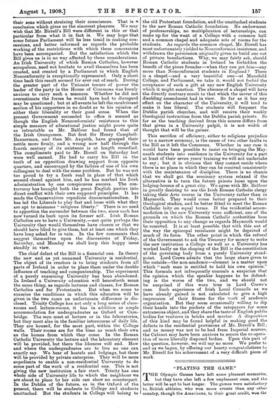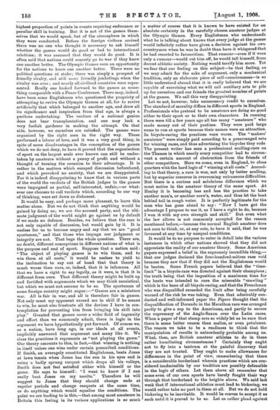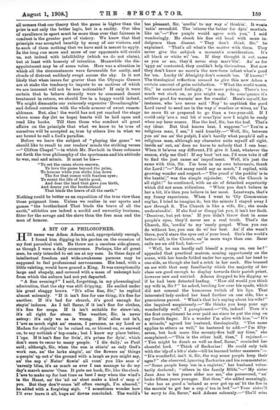"PLAYING THE GAME." T HE Olympic Games have left some pleasant
memories, but they have also left a few unpleasant ones, and the latter will be apt to last longer. The games were satisfactory to, British athletes, who won more events than any other country, though the Americans, to their great credit, won the
highest proportion of points in events requiring endurance or peculiar skill in training. But it is not of the games them- selves that we would speak, but of the atmosphere in which they were conducted. Before the foreign visitors arrived there was no one who thought it necessary to ask himself whether the games would do good or bad to international relations ; it was assumed that they would do good. It is often said that nations could scarcely go to war if they knew one another better. The Olympic Games were an opportunity for the nations to know one another better. There were no political questions at stake; there was simply a prospect of friendly rivalry, and still more friendly junketings when the rivalry was over ; and nearly all civilised countries were repre- sented. Really one looked forward to the games as some- thing comparable with a Peace Conference. There may, indeed, have been some Englishmen who questioned the propriety of attempting to revive the Olympic Games at all, for to revive artificially that which belonged to another age, and drew all its significance and inspiration from that age, is always a perilous undertaking. The verdure of a national genius does not bear transplantation, and one may look a very foolish gardener in making the attempt. On that side, however, we ourselves are satisfied. The games were organised by the right men in the right way. These performed a labour of love, and it was a very good thing, in spite of some disadvantages in the conception of the games which we do not deny, to have it proved that the organisation of sport on the largest scale ever known can still be under- taken by amateurs without a penny of profit and without a thought of turning the occasion to their advantage. It is rather in the matters which escaped discussion beforehand, and which provoked no anxiety, that we are disappointed. For it is indeed disappointing to know that in various parts of the world the verdicts of the British judges in the games were impugned as partial, self-interested, unfair,—or what- ever one chooses to call verdicts which, according to our way of thinking, were set down as dishonest.
It would be easy, and perhaps more pleasant, to leave this matter alone. But we do not think that anything would be gained by doing so ; we are the accused party, and the ulti- mate judgment of the world might go against us by default if we made no defence. Besides, we believe that the case is not only capable of discussion, but would gain by it. It is useless for us to become angry and say that we are " good sportsmen," and that those who impugn our judgment or integrity are not. That begs the whole question. There are, no doubt, different conceptions in different nations of what is the purpose and end of sport. Suppose that a nation said : "The object of playing games is to win them, and to win them at all costs," it would be useless to yield to the inclination to say out of hand that that theory is much worse than ours, or, indeed, that it is infamous. All that we have a right to say legally, as it were, is that it is different from ours. That different theory might be built up and fortified with arguments which we may think casuistical, but which we must not assume to be so. The sportsman of some foreign country might argue :—" Games are a miniature war. All is fair in war, and all is therefore fair in games. Not only must my opponent exceed me in skill if he means to win, he must also frustrate all the devices I have in con- templation for preventing him from bringing his skill into play." Granted that games cover a wider field of ingenuity and effort than we commonly admit, there is logic in the argument we have hypothetically put forward. Of course we, as a nation, have long ago, in our ideals at all events, implicitly answered that argument and many like it. We class the practices it represents as " not playing the game." Our theory amounts to this, in fact,—that winning is nothing in itself unless one wins under certain prescribed conditions. If Smith, an averagely constituted Englishman, beats Jones at lawn tennis when Jones has the sun in his eyes and is using a badly sprung racquet which drops all his volleys, Smith does not feel satisfied either with himself or the game. He says to himself : "I want to know if I can really beat Jones on my merits." Therefore he will suggest to Jones that they should change ends at regular periods and change racquets at the same time, or do anything which would equalise the conditions. The point we are leading to is tbis,—that among most amateurs in Britain this feeling in its various applications is so much a matter of course that it is known to have existed for an absolute certainty in the carefully chosen amateur judges at the Olympic Games. Every Englishman who understands what he is talking about knows that every judge at the games would infinitely rather have given a decision against his own countrymen when he was in doubt than have it whispered that be had resorted to favouritism. That rumour—even if it were only a rumour—would cut him off, he would tell himself, from decent athletic society. Nothing would terrify him more. Yet we fear that our feeling on this subject—be that feeling, as we may admit for the sake of argument, only a mechanical tradition, only an elaborate piece of self-consciousness—is so little understood abroad that it is really believed that we are capable of exercising what we will call auxiliary arts to pile up for ourselves and our friends the greatest number of points at the games. We call this very disappointing.
Let us not, however, take unnecessary credit to ourselves. The standard of morality differs in different sports in England. Professionals who pretend to be amateurs are doing no good either to their sport or to their own characters. In running there were till a few years ago all too many "amateurs" who made money out of their pastime. They were paid large sums to run at sports because their names were an attraction. In bicycle-racing the practices were worse. The "makers' amateurs" were simply paid according to a prearranged rate for winning races, and thus advertising the bicycles they rode The present writer has seen a professional sculling-race on the Thames in which nearly every competitor had to circum- vent a certain amount of obstruction from the friends of other competitors. Here we come, even in England, to close quarters with the hard logic of " winning at all costs." Accord- ing to that theory, a race is won, not only by better sculling, but by superior resource in overcoming extraneous difficulties. But there is a curious and salubrious difference which we must notice in the amateur theory of the same sport. At Henley it is becoming less and less the practice to take another man's, or another crew's, water, and thus let the boat behind toil in rough water. It is perfectly legitimate for the man who has gone ahead to say : " Now I have got the advantage I propose to use it, as I have a right to do, because I won it with my own strength and skill." But even what the law allows is not commonly accepted for the reason mentioned before,—because the normal English amateur does not care to think, or, at any rate, to have it said, that he was favoured at any time by unequal conditions.
It would be to no purpose to enter in detail into the various instances in which other nations showed that they did not appreciate the reality of our amateur theory. Some American papers expressed a belief in the supremely incredible thing,— that our judges declared the four-hundred-mbtres race void because they saw that if they did not the Englishman would be beaten. Some French papers believed that the " time- limit" in a bicycle-race was directed against their champions ; the truth being that the imposition of a maximum time for the beats was intended to cure the miserable "crawling" which is the bane of all bicycle-racing, and that the Frenchman who was disqualified exceeded the limit after being carefully warned of the risk he was taking. Even that admirably con- ducted and well-informed paper the Figaro thought that the disqualification of Dorando in the Marathon race was arranged partly to give a sop to the Americans, and partly to secure the supremacy of the Anglo-Saxon over the Latin races. When a paper of that stamp errs so widely let us be sure that there is some better reason than malice, or even petulance. The reason we take to be a readiness to think that the manipulation of results is antecedently probable among us. What, then, are British amateur athletes to do in these rather humiliating circumstances P Certainly they ought not to fly into a tantrum at the painful discovery that they are not trusted. They ought to make allowances for differences in the point of view, remembering that there is a considerable borderland wherein practices which are con- sidered inadmissible by our tradition are possibly defensible in the logic of others. Let them above all remember that some even of our own sports have barely fought their way through that borderland to the heights above. We said last week that if international athletics must lead to bickering, we would rather take no part in them at all. But we do not hold bickering to be inevitable. It would be craven to accept it as such until it is proved to be so. Let us rather plead against all context; that our theory that the game is higher than the prise is not only the better logic, but is a reality. Or idea
eiCeellence in sport must be more than ever that fairness in conduct is the greater part of vigtory. We know that that principle was accepted heartily by many of our visitors, and to such of them nothing that we have said is meant to apply.
In the long run more and more of our opponents will credit us, net indeed with infallibility (which we do not claim),
but at least with honesty of intention. Meanwhile the dis- appointment may be of some value. Here was a Situation in
which all the circumstances were favourable for amity, and clouds of distrust suddenly swept across the sky. Is it not likely that when issues far graver than the Olympic Games are at stake the tendency to impute to us motives of which
we are innocent will not be less noticeable? If only it were
certain that to behave decently were to command decent treatment in return, we should live in a happy world indeed.
We might dismantle our ruinously expensive ' Dreadnoughts' and defend ourselves with the whole arwour of sweet reason- ableness. But, alas ! the world has not yet reached the stage where some day (let us hope) hearts will be laid open and read like books. Till then those who conduct all great affairs on the principle that what we know to be true of ourselves will be accepted as, true by others live in what we are bound to call a fool's paradise.
Before we leave the subject of " playing the game " we should like to recall to our readers' minds the striking verses —" Clifton Chapel "—in which Mr. Newbolt in these columns
set forth the true philosophy of the sportsman and his attitude to war, real and mimic. It must be his—
"To set the cause above renown,
To love the game beyond the prize, To honour while you strike him down
The foe that comes with fearless eyes; To count the life of battle good, And dear the land that gave you birth, And dearer yet the brotherhood
That binds the brave of all the earth."
Nothing could be better as an exposition of the true view than these poignant lines. Unless we realise in our sports and games " the brotherhood That binds the brave of all the earth," athletics are indeed a sordid and unworthy business, fitter for the savage and the slave than the free man and the man of honour.




































 Previous page
Previous page